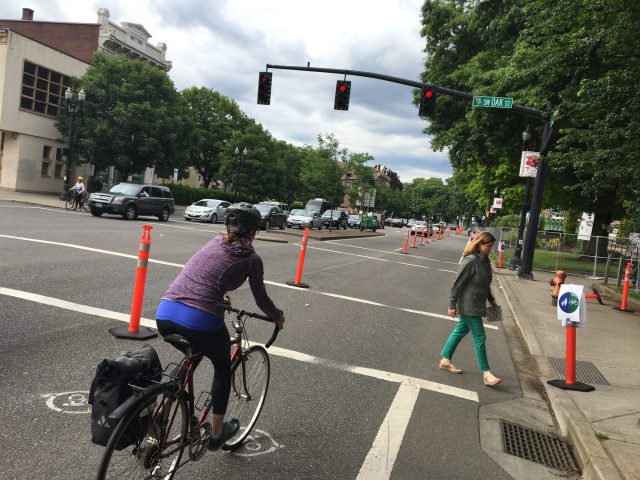
(Photo: J. Maus/BikePortland)
Ask BikePortland is a regular column. Browse the archives or drop us a line if you have a question you’d like us to answer.
Today’s question is about Better Naito, the temporary project that has created a two-way, 15-foot lane for biking and walking on Naito Parkway.
Reader Skip Winters lives in West Linn and commutes into northeast Portland (thanks to an electric bike he says). His favorite part of the ride is Naito Parkway, especially now with the generous amount of space and safety afforded by the new alignment. But he’s confused about the signals.
Here’s his question:
“I’m just a bit confused about the signage and the rules – and have in the past month seen all variations of how riders are handling it. Some folks cruise along ignoring the lights. Some full stop if they are red – causing a few near-collisions with bikes treating the intersection, red light or not, as ‘full-speed through traffic.’
Are we supposed to stop at red lights only if there are pedestrians? Is that why the “Stop for Peds” signs have been painted and placed on the cones?”
Adding to the confusion is there is at least one bike specific traffic light near the Morrison Street bridge. Should we infer that that’s the only light to pay attention to? In addition to watching for pedestrians?”
Advertisement
Thanks for asking this question Skip!
I’ve been riding this at least once a day and have seen (and felt) the confusion first-hand. As an aside, T-intersections where the bike lane continues have long been a pet-peeve of mine. Along with allowing “Idaho stops,” I think we should allow bicycle riders to carefully roll through T-intersections when it’s safe. But I digress, let’s get you some answers…
I asked PBOT spokesman Dylan Rivera what’s up.
To the chagrin of you “full-speed” types, Rivera said — surprise! — everyone needs to stop for the red lights. “Those people are doing the wrong sort of cruising. If you want to get technical about it,” he added, “by the definitions of the Manual of Uniform Traffic Control Devices (MUTCD), the people on bicycles are part of the intersection (<30 feet from the Naito traffic signal) and therefore they should stop at the red light." And what about the "Stop for Peds" signs? Should people infer that it's cool to roll through if nobody is walking across the street? Nope. "That's the wrong inference," Rivera said. "If the light is red, you should stop." While laws are cut-and-dry, the signalization is confusing and it's one of the downsides of the Better Naito project. If you have feedback on this issue, please make sure to let the City know about it by emailing NaitoParkway@portlandoregon.gov.
CORRECTION: This post initially stated that the City’s response came from Signals, Lighting and ITS Division Manager Peter Koonce. I regret the error and any confusion it may have cause.
— Jonathan Maus, (503) 706-8804 – jonathan@bikeportland.org
Our work is supported by subscribers. Please become one today.



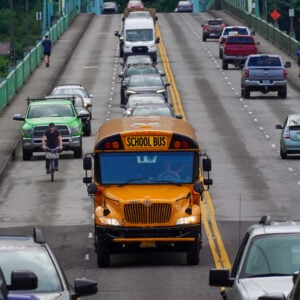
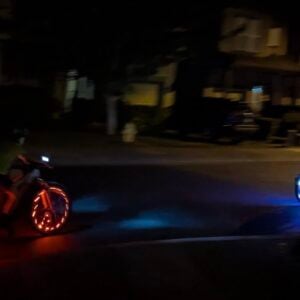
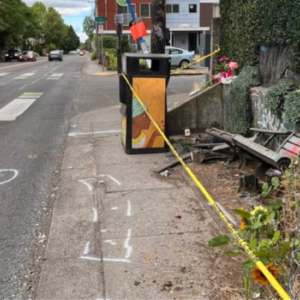
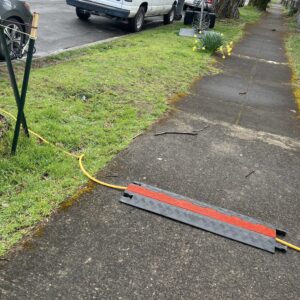
Thanks for reading.
BikePortland has served this community with independent community journalism since 2005. We rely on subscriptions from readers like you to survive. Your financial support is vital in keeping this valuable resource alive and well.
Please subscribe today to strengthen and expand our work.
intersections where the bike lane continues have long been a pet-peeve of mine. Along with allowing “Idaho stops,” I think we should allow bicycle riders to carefully roll through T-intersections when it’s safe.
Hear, hear.
What’s the design of a permanent better Naito that accommodates pedestrians crossing the bikeway cyclists aren’t expecting to stop in when the pedestrian is in a rush to make the light? I realize you and Jonathon want people to ‘carefully’ roll through, but what design encourages that? Is there a way to get people to slow down enough when a car is stopped at the light impeding sightlines that people walking won’t have to peak around a car/truck to see if anyone is coming in the bikeway?
Hans Monderman?
Red traffic light always trumps all, unless you see a sign that specifically says cyclists can roll through a red.
You have the law (as it now reads) on your side, but you don’t have much logic when it comes to a better way to get through. T-intersections are not a level playing field for all when it comes to the risks, dangers, responsibilities. Obviously we need not run into each other, but this can be attempted with one-size-fits-all rules or with something more interesting.
Having this marked off in construction colors makes it a detour to me and that changes everything.
logic? red lights are pretty straight forward. there’s really not much room for interpretation or confusion. the rest of it is wishful thinking..
Not at all.
(a) traffic lights were invented to deal with the swelling ranks of the auto-bound, not those astride bicycles. And as Hans Monderman discovered, even those in cars can get along fine without signs and signals if you design things right.
(b) traffic (in this case, bikes where no pedestrians are present) do not cross the path of cross traffic (light or no light), and their stopping and remaining stopped would be entirely gratuitous under the conditions outlined above.
Yes we have a (to you) unambiguous signal that in theory applies to everyone, but as we well know there are places and times where exceptions have been introduced that all recognize the (logical) limits of this one-size-fits-all control device.
what does a stop sign mean?
In Idaho it means something different than it does in Oregon, if you are on a bike.
Sadly, there is no such sign. 🙁
If this were a fully channelized protected bike lane, it is possible that the bike lane could be yield controlled while the rest of the intersection is signal controlled, this would be similar to the channelized right-turn slip lanes seen on larger arterial intersections.
How about a flashing yellow bike light to just override the red for bikes? We already have a flashing red bike light on the tilikum crossing crossing (That light should also be flashing yellow.)
Oh, Nick’s saying use a bike-specific yield sign. Yes, let’s do.
Can’t we just hang an ‘except bicycles’ sign next to the red lights on Naito year-round?
That may be what you think, but I’m not doing it. Red lights apply to cars because they kill people. Bikes don’t kill people so they don’t apply to me. I don’t even slow down at intersections like these and I haven’t had more than one or two close calls in the last decade. Don’t be a sheep!
please educate yourself
http://www.newyorker.com/news/news-desk/bicycle-crash-kills-another-pedestrian-central-park
But his point is still well taken: forks and shoelaces and backpacks probably kill more people than bikes do.
And when a cyclist runs a light and hits a pedestrian, it won’t be the fault of the cyclist, but rather the city for building substandard infrastructure. Really the city should just get rid of the crosswalks until the bike lane isn’t right next to stopped cars that will obstruct the view of pedestrians crossing in the crosswalk with a walk signal for a cyclist riding at full speed.
http://bikeportland.org/2015/10/21/trimet-releases-video-statement-on-tilikum-collision-166443#div-comment-6576975
Yes, The number of pedestrians killed by bikes is small. But it happens. And people killed by shoelaces and backpacks? It probably wasn’t someone else’s actions that did them in.
Shoelaces definitely can kill. I once found myself being followed in a dark alley by what appeared to be a worn-out shoelace. Knowing their reputation, I confronted it, spinning around and demanding, “You–behind me! Are you a worn-out shoelace?” Imagine my relief when it replied, “No, I’m a frayed knot”.
Then I should be able to drive through a red light when there are no other cars present because my ability to harm someone is zero percent.
I’ve nearly been hit on a few occasions, as a pedestrian crossing the street and as a cyclist making a left turn into the bike lane, by other cyclists blasting through the T intersections on Naito without slowing down. If you don’t want to stop, that’s your choice, just keep in mind that red light means someone else has the right of way and in a collision you’re at fault.
In OR the red traffic light does not trump all if you are riding a bike:
Permits bicyclist or motorcyclist to proceed at stop light…
https://olis.leg.state.or.us/liz/2015R1/Measures/Overview/SB533
so you’re saying that the “stop for peds” signs were a waste of time/money and have absolutely no authority…
good to know… I took them as a replacement for the existing traffic controls… which I think is an argument that could hold up in court since the newest controls usually win over the older ones…
If someone cruises through one of these reds and creams some festival goers this summer, we are going to have some really bad PR. Slow down and proceed with caution folks!
One cyclist does something bad: blame all cyclists! No protected bike lane for you!
Hundreds of drivers do something bad: unavoidable accidents! More lanes on the highway!
It’s so much easier to lump everyone different together! “That terrorist is muslim, all muslims are terrorists! That cyclist ran a red light, all cyclists are a menace!” Meanwhile, if another driver does something obnoxious, it’s “That’s guy’s a menace!”
I stop for people, but I rarely stop for no one.
what if I convert to a pedestrian into the pedestrian lane? then aren’t I allowed to roll through the lights as if I were a pedestrian on a sidewalk?
do the pedestrians in the curb lane need to obey the red lights as well? if not, then I’m moving into that lane to run the lights… unless none of the lanes have any legal status… in which case I could ride in the motor vehicle lane without having to abide by the side-path law…
or does the original bike lane still retain its legal status and I’m required to ride there?
what is the current legal status of the previous bike lane turned pedestrian walkway?
so no, this article doesn’t cover enough of the possible scenarios to let me know what I’m allowed to do with this reconfiguration…
The pedestrian path should be exempt. Technically it is on the street, but functionally it is a continuous sidewalk unbroken by an intersection.
This loophole doesn’t exactly break the inverse relationship between legal and worthwhile things, though.
This is in interesting example of treating bicyclists as vehicles similar to cars (and common in the U.S.) and not as fast pedestrians. But at the same time, the bicyclists are mixed with the pedestrians, which only increases confusion because some of the folks on the separate lane are allowed to walk when there is a red light while others (who happen to be sitting on a bike) are not.
One solution would be to have separate bike / pedestrian lights, that could flash orange. But that would require more money …
Maybe? Pedestrians generally have to follow traffic lights the way vehicles do (except they can’t enter an intersection on a yellow) unless they are overridden by a pedestrian specific traffic control device (walk/don’t walk sign). I’m not sure that loophole actually works.
http://www.oregonlaws.org/ors/814.010
“4) A pedestrian facing a traffic control device with a steady red light shall not enter the roadway unless otherwise directed by a pedestrian control signal.”
except that you’re already in the roadway and not entering it, so this doesn’t apply…
I think you would be in violation of the sidewalk biking ordinance.
the sidewalk biking ordinance doesn’t apply to that side of Naito…
everywhere around the city each traffic lane has its own traffic light, except for bike lanes… this gives the impression that bike lanes have no traffic controls… you’re not supposed to obey the traffic controls of other lanes… this seems like a serious enforcement issue…
I don’t stop for the red lights on Naito, but I’m also riding along at 10 mph. It’s hard to even see half the signals anyway, since there’s nothing above the bike lane. If there’s a large group of people walking, I’ll just slow down and go around. However, I find it odd that we’re supposed to stop for all reds like a car driver, but when we want to turn left into downtown, we’re on our own with no signal. Funny how we’re expected to follow exactly the same rules as car drivers, yet we’re consistently given inferior infrastructure.
That’s exactly what I do. Weaving between people crossing the street is pretty easy and they don’t mind because I’m not slowing them down any.
Motorists weaving their car around bicycles is also pretty easy and doesn’t slow down the bicycles. Do you mind that?
Thats not even close to the same thing.
let’s see…
motorists are over 10x more mass than a cyclists…
cyclists are up to 1.5x more mass than a pedestrian…
so yeah, not the same comparison, and yes, I mind the difference in physics a LOT…
The pedestrians I’ve talked to do mind. It is the number 1 complaint I hear against cyclists from my coworkers.
at that speed, maybe you should be on the waterfront path.
I do usually take the waterfront path, but during festival season it’s often fenced off and I can’t get to the street I need to turn down. I tried once and they asked for money to get into the carnival. 😛
that’s the problem…
we’re going over 3x the speed of pedestrians, but 1/3 the speed of cars…
does that qualify for “fast bikes use Naito”?
the real difference is mass… for better mass compatibility we should be on the pedestrian path… speed compatibility is the same either way…
I’ve been coming across this. I run from my office and around the waterfront daily, and have had trouble with cyclists not yielding to pedestrians crossing Naito. I slow down, make eye contact, and hold up my hand in a “stop” gesture as I cross in the crosswalk with the walk signal lighted, the same way I do with cars. So far it’s 50/50 on whether cyclists will stop, which is about the same as what I experience when crossing an intersection with a stop sign elsewhere in the city. I’m also a cyclist, btw.
They don’t really need to stop for you. Just walk into the intersection, they can get around you easily.
I prefer not to just step out in front of them or assume that they see me. Getting hit by a bike looks like it would hurt.
acutally…they DO need to stop for pedestrians in a crosswalk.
I turn north with a green light onto Naito from Stark and with “Better Naito” i’m always worried I’m going to get creamed by someone going south or north. I should have the right of way but with everyone running the lights going both ways it feels more dangerous than before.
even with Idaho-stop laws this would be illegal on the part of the cyclists… you always yield to the more vulnerable user, in all modes, in all cases, in all scenarios…
I’ve stepped over cyclists’ front wheels who were blocking crosswalks… and stepped in front of plenty of cyclists and cars…
unfortunately there are still a lot of PEOPLE that don’t get it, no matter their mode… it’s still possible to bike like an oblivious motorist…
I asked this question last year regarding the shorter-term Better Naito installation and got the exact opposite response from the Better Blocks people. It almost makes taking Naito not worth it if I have to stop for the red lights. The waterfront path might be faster overall because at least I don’t need to stop.
I don’t like to stop moving… period… doesn’t matter my mode, I just don’t like sitting still… I’ll go way out of my way to avoid sitting still in traffic… I’ll walk a mile across town to avoid waiting for the next bus… I’ll bike up onto the sidewalk to avoid waiting at the light…
whatever mode allows me the most freedom of movement is the one that I enjoy the most… usually it’s walking… the delays start getting worst the more complex your vehicle…
What about heading South on Better Naito? Aren’t the red lights only visible to cyclists heading North? While I ride North almost daily, I never ride Southbound, so I honestly don’t know.
That was my first thought when riding through there also, no signage for a whole direction of travel? the laws are not cut-and-dry.
There are a few signals installed for southbound cyclists at Pine, Morrison, Taylor, and Salmon. But yeah, otherwise the signals are facing the wrong way and the ones for southbound drivers are too far away to really see well.
“There are a few signals installed for southbound cyclists at Pine, Morrison, Taylor, and Salmon”
I don’t see what you’re talking about… there are no lights for cyclists in these locations… there are only lights for the motor vehicle lanes, and southbound they’re only on the southbound side of the street…
cyclists heading south on Better Naito have no traffic controls other than “stop for peds” where those signs actually face them…
This is one reason the estimate for Better Naito was so high.
$500 k for the path, $750k for signal upgrading.
How are you planning to accommodate turns into downtown? Wouldn’t it be better/cheaper to ditch the two-way cycle track design in favor of two separate one-way cycle tracks on either side of Naito? Likely irrelevant since Better Naito is no longer in the budget, but worth asking.
What are you expecting for turns downtown?
Have cyclists wait for the light to change? Pave a pullout a few feet into the park so they don’t block pedestrians or cyclists while waiting? Combine that with narrow the bikeway at every cross street to try to get cyclists to slow down so they can yield to pedestrians, and put up flashing red lights instead of solid red lights for cyclists when pedestrians are crossing? Would that be faster/safer/more comfortable heading south than a path/lane on the west side of naito?
Well that’s the thing. Normally you’d put a jug handle so people turning left can get out of the bike lane. But Parks had specifically opposed anything within Waterfront Park itself, including sidewalks. This is why I believe the two-way design is flawed. There’s really not room for people turning to wait. A one-way cycle track could be wider and give people turning a bit more space without blocking the oncoming lane. And of course, separate turning signal phases for people cycling are a given.
I’m interested in how much money the Median originally cost, yearly maintenance (landscaping) cost, and seeing a total re-design of the whole thing, again.
Raised bike lanes after this season are just out for me ( they don’t get swept), the parking next to them creates a hooking hazard and when parked in they still wont get swept even if you call it in.
So is having two cycle lanes face each other… one on each side, I guess it’s just a flow of traffic feel for me.
I always stop at this light but feel stupid doing it. Thanks for setting the record straight.
“While laws are cut-and-dry, the signalization is confusing and it’s one of the downsides of the Better Naito project.” How is it confusing? Better Naito never took away the crosswalks red lights. What has changed that would indicate those still very visible pieces where not there and ignored? This has been answered before, and I cannot see anything done to confuse the situation. http://oregonbikelaw.com/facing-red-light-bicycle-lane-t-intersection-charley-gee/
“How is it confusing? Better Naito never took away the crosswalks red lights.”
it’s confusing because they added traffic controls such as “stop for pedestrians” and now we have conflicting traffic controls… is it a stop sign, a light, or a conditional stop? and what about southbound traffic with no light? do they obey the stop sign but northbound obeys the light? plenty of confusion to nullify all of the traffic controls in court…
This Naito is Better. As a permanent multi-use route with proper signals and ped crossings it will be Way Better. Let’s make it happen.
I think this is a great point and is a serious downside to “Better Naito”. I prefer the waterfront over the Naito path because of the red lights. I rather switch to the east side esplanade than using “Better Natio”. So that affects the number of bicyclists on “Better Naito” and in turn its perceived success.
This could be an example of putting some bike infrastructure in, not being willing to spend enough money to make it work well, and then arguing that there is little demand. The answer is simple: make is the quickest way to get from A to B and people will use it.
Since every motorist obeys the speed limit, I understand why cyclists must stop for red lights.
Within a certain %
On a sorta- related note, what do you all do for buses with the stop sign out? For example, I often encounter them on the Walker Rd adjacent to NIKE. The buses are heading in the opposite direction of me, and I stop despite the fact that the kiddos never cross the street (and I have zero chance of hitting anyone).
I stop, the person that i backseat drive for doesn’t 🙁
I stop because it’s impossible to see pedestrians who may be crossing in front of the bus. I also yield to buses pulling out — my trip is not more important than that of the many people in a bus.
If you’re talking about a school bus, then you must stop unless there is a physical median separating your side of the road from the side the bus is on. If you are following a school bus, or approaching a school bus from the opposite direction on a street without a physical median, you must stop when the red lights flash. Examples: If a school bus were to stop on Murray Blvd across from Nike and you were traveling the opposite direction, you would not have to stop. Same situation further south on Murray (toward TV Hwy), you Would have to stop, since there is no physical median.
For city buses, I’m not sure what the official rules are, I just never pass a stopped bus on the right, and pass on the left with extreme care. I have a theory that young people who grew up taking the school bus have a hard time breaking the habit of getting off the bus and immediately crossing in front of it. I almost ran over a young lady once (while riding my bike) because she came striding out from in front of a bus while I was passing it (the bus was in a pull-out, so the lane was not blocked at all).
you stop, or go onto the sidewalk…
http://bikeportland.org/2011/04/12/bike-law-101-waiting-or-not-for-the-school-bus-51213
I interpreted the octagonal stop sign image with “stop for pedestrians” as meaning we should treat the intersections as if they had a stop sign when people are crossing (when they have the the WALK signal). I was surprised to hear that the city expects everyone to come to a full stop for the duration of red lights when there is no cross traffic. So obviously the signage is confusing.
My interpretation: cyclists are not stopping in the bike lane for a red light even though the bike lane is a lane of traffic. City, in desperation, puts out the “stop for pedestrians” signs so that at a minimum pedestrians will not be strafed.
It is disheartening to see so many people willing to treat pedestrians like motorists treat bicycles.
Based on the picture it looks like there is a light above the temporary bike lane. Could they cover the light it up to look like a bike signal? It’s not at the ideal height for a bike lane but might help clarify that bikes should obey the light as well.
Why don’t those red-light-stopping rule-followers just use the hand signal to indicate a slow or stop?
Oh yeah because this is Oregon where no one signals.
I very rarely use my stop/slow hand signal because I’m too busy using the brakes and steering as allowed by the exception to the signalling law…
How confused about a red light do you have to be?
It’s a red light.
There are pedestrian crossings at every intersection across Naito.
It means stop.
It’s hardly difficult.
“How confused about a red light with an added conditional stop sign do you have to be?”
fixed that for you…
I vote for this for comment of the week.
One cyclist? Read all the comments, there’s a lot of cyclists behaving badly. Stanley Roberts ought to come up here.
Stopping at reds on natio without peds is pointless and littererly a waste of time and energy.
Use your head people!
Stopping at a red light in a car without anyone around is a waste of time and energy too, just run it!
It’s not uncommon for this to happen more frequently during the early morning hours in my experience.
I’ve seen this a few times.
if only the car didn’t weigh over 2 tons then the consequences of negligence would be comparable…
Provided you are willing to wait “one full cycle of the traffic control device.” Not really relevant as a justification for rolling (or cruising) through stop lights.
if the light is not working it is up to the person cycling to “estimate” the length of the cycle. my estimates are that cycles are at most a few seconds long. 😉
That’s a hard sell if there are other vehicles the detector would not fail to pick up that are waiting at a red light.
The longest “full cycle” I’ve encountered is 90 seconds. If I’ve waited 90 seconds at a light that has not turned green for me, I go at the earliest safe opportunity. Of course, there are some lights that I “know” won’t detect me, so I don’t wait quite that long.
Poorly written law. If you get a full cycle, that means you got a yellow a red and a green.
by leaving the estimation of the cycle length to the person cycling this law reduces the likelihood of a citation for running a slow or non-functioning light in the absence of cross traffic. one small step towards the sanity of an idaho stop law.
Except Idaho stop does not refer to an intersection controlled by a light.
The Idaho stop allows a person cycling to treat a red light as a stop sign (e.g. stop, look, proceed through red light).
To clarify, a full cycle is your yellow, red, the crossing green, yellow, red, and your green.
So if you don’t get a green, you can go whenever you’ve had at least one green. Right.
I fixed it: ?dl=0
?dl=0
Add gaps in the curb for the other crosswalk and for bikes entering/exiting the bikeway.
So this very morning I had a red light on Naito at Yamhill and I circled around to cross to the west side of Naito via the cross walk as I do every morning and was nearly run down by a cyclist that did not believe he needed to stop. I said, “hey, that’s a red light,” and was berated by him for not knowing “how this works, dude”, to which I replied, “that’s a red light” and proceeded to cross. People, if it’s red/stop sign and you don’t stop, and nearly run someone over, you are at fault. Get used to it.
Thanks for pointing out that danger too. I regularly cross Naito at Couch heading towards the waterfront, and it never occurred to me that I could get plowed into by a cyclist heading northbound on Naito. It’s never even crossed my mind.
With a permanent protected and separated bike lane at T-intersections the bike lane should have its own separate traffic light to allow green until pedestrian crossing phases.
They should just install those swinging Tri-met gates at each light… That will fix the problem.
Thank you for the heads up!
I think many of us are confused because we were under the impression that Better Naito turned the bike lane into a “multi-use path” separate from the roadway, even though it’s still technically on it. In that scenario, we would still yield to pedestrians but treat red lights as though we were on separate pedestrian-bike infrastructure (like a sidewalk we can legally ride on).
I will totally stop at these red lights, but I understand why others currently don’t. A confused cyclist asked my partner why he stopped at these red lights on bike just the other day. It’s counter-intuitive since this isn’t a protected bike lane, but rather a weird pedestrian-bike combo that is a sidewalk for them and just a normal on-street bike lane for us.
Do pedestrians have to stop walking also????? Of course not. I’ll continue to ride safely, yield to people on foot, be nice to others, and roll through the lights on Naito in the new Better Naito MUP